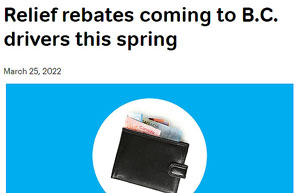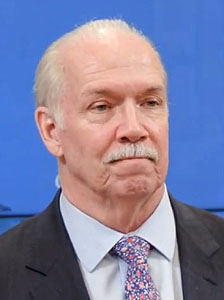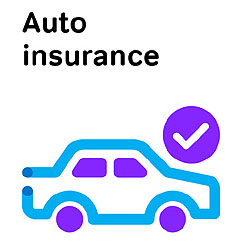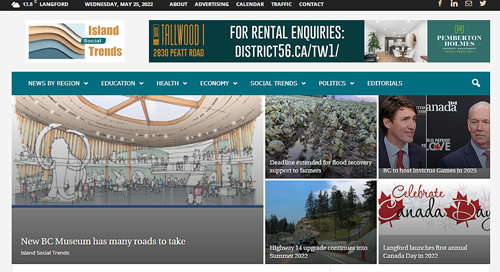Wednesday June 1, 2022 | VICTORIA, BC [Updated June 2, 2022]
COMMENTARY by Mary P Brooke | Island Social Trends
The ICBC relief rebate being anticipated by many insured drivers across BC is still rolling out.
The political messaging back in March was that the $110 for individual policy holders and $165 for drivers with commercial insurance would be issued in May. That was carried by news media across BC.
Deeper into the details — released in a March 25, 2022 ICBC news release but not fleshed out since then with any noticeable communications) — will have some recipients waiting until June or July to receive their rebate. Some of that will happen by direct deposit and others by a cheque in the postal mail.
For people just remembering ‘the headline’, so to speak, they will have been expecting their rebate to show up in their bank account (as did some other BC Government rebates during the pandemic).
That has left some people vulnerable to phishing attacks by text and email, by which messages offer a link to click on to activate the rebate. And unfortunately some of that illicit gathering of personal data and banking information has been happening for anyone who clicked on those links.
ICBC comment:
Today a senior supervisor within ICBC has told Island Social Trends that ‘plenty of advertising’ has been done, and that there’s been lots of media. That ICBC rep also revealed that the auto insurer has received several calls about people having been caught in phishing scams (by text or email).
However, there has been little if an advertising campaign, per se (i.e. logo-stamped messaging in boxes placed in digital media and newspapers), and only the one media release issued now over two months ago. Yes, the information is detailed on the ICBC.com website, but not everyone in their busy lives goes there first for something that was announced as essentially ‘being taken care of’ (i.e. just wait for your rebate to arrive).
That shows a disconnect between what is believed — within ICBC — is different from the actual experience and lived reality of people on the ground (in the community). This is a consistent potential pitfall in professional (particularly government) communications… that the message is issued once and therefore (especially if it’s a big message) that everyone will be keyed into all the details externally as they are internally.
Yes, there can be a circular race with people of malintent in the digital world (i.e. hackers and phishers) and the agencies (like government and crown corporations) that by their very stature might be used to command the undue attention of innocent victims. Most of us have heard of the phishing and hacking resulting from links that appear to be sent from major entities like the Canada Revenue Agency or Canada Post. But it’s up to large corporations like ICBC to try and be on the winning side of that battle.
Ministry comment:
Today the Ministry of Public Safety and Solicitor General, the ministry responsible for ICBC, provided this comment to Island Social Trends:
- ICBC is aware some of its customers have received text messages regarding their ICBC relief rebate. These messages are fake. ICBC has been informing its customers of the scam by communicating to media outlets, posting and responding on social media, and a notification on icbc.com.
- PLEASE NOTE: ICBC will not issue any rebates to customers via text message or email. If you receive a text message asking you to click a link to receive your relief rebate, please delete the message – this is a scam.
- ICBC is on track to deliver rebates to customers as planned. As of June 1, ICBC has issued more than $56 million in rebates to customers.
- Customers who signed up for direct deposit with ICBC began receiving their rebates in May. Link here: https://www.icbc.com/insurance/buy-renew-cancel/Pages/set-up-direct-deposit.aspx
- As of today (June 1), ICBC issued nearly 25,000 direct deposit rebates and roughly 480,000 credit card rebates.
- All other customers, including those who paid by debit, cash, cheque or payment plan will receive their rebate as a cheque starting in June.
- ICBC expects to have all cheques mailed to customers by the end of July.
- Overall, ICBC will be sending out roughly 3.5 million relief rebates to our customers totalling $396 million.
Passive followup:
That is seen, in fact, in the ICBC management insistence that they ‘did their job’ with supposedly lots of media coverage. When? Two months ago. And where? TV and Twitter, two places that a good chunk of British Columbians do *not* regularly view or visit.
That lesson should have been learned during the rollout of COVID public health information over two years… the style and method and delivery, across many channels, was still not getting through to various sectors of society. Coming clean on that realization — and trying to do something about it — still showed much evidence (by way of public response or non response) that proper timing was the missing element of success in that project.
As professional and eager that the media profession is (ourselves, we try), not every story is fleshed out beyond the initial news release. Crown corporations of government must themselves release information in a timely fashion, and repetitively if necessary. The biggest fail point of any communications strategy is assuming that all bases have been covered. Maybe on day one a big blast will seem like it does the job, but what about the period after that — which in the case of the ICBC relief rebate is an active period until all the rebate payments/cheques have been issued.
Grief for those who’ve fallen prey:
The ICBC relief rebate public relations effort started out relatively well on the political side of things … everyone remembers Premier Horgan announcing the relief rebate and it stuck in the public mind that the funds would roll out in May.
It’s the communications strategy for this rollout that we suggest here has been slack, and for some people — who got caught in the snares of phishing scams — has faltered badly.
Anyone who released personal or banking information in response to a text or email may now have weeks or months of worry and also the work of changing information with banks and other agencies.
[Phishing (pronounced: fishing) is an attack that attempts to steal your money, or your identity, by getting you to reveal personal information — such as credit card numbers, bank information, or passwords — on websites that pretend to be legitimate.]
When rebates will be issued:
Here is exactly what ICBC posted in an ICBC news release on March 25, 2022:
“Starting in May, customers who have signed up for direct deposit with us will receive their rebate in their bank account. Customers can sign up for direct deposit on icbc.com or contact their Autoplan broker.
Customers who have paid for their insurance with a credit card can expect to receive their rebate as a credit on their card between May and June.
All other customers, including those who paid by debit, cash or payment plan will receive their rebate as a cheque starting in June. However, customers can sign up until April 30 to receive their rebate through direct deposit instead.
We expect to have all cheques mailed to customers by the end of July.
Regardless of the rebate payment method, all eligible customers will receive a letter confirming when their rebate is issued.
Customers with leased vehicles will receive a cheque starting in June. Typically, the company that the vehicle is leased from must endorse the customer’s refund cheque. However, we’ll be contacting some leasing companies to obtain authorization to issue cheques directly to customers. In our letters to customers, we’ll outline whether they need the leasing company to endorse their cheque.”
===== RELATED:
ICBC rebate to drivers coming in May (March 25, 2022)








